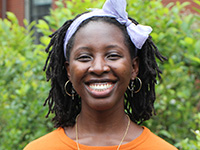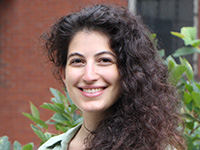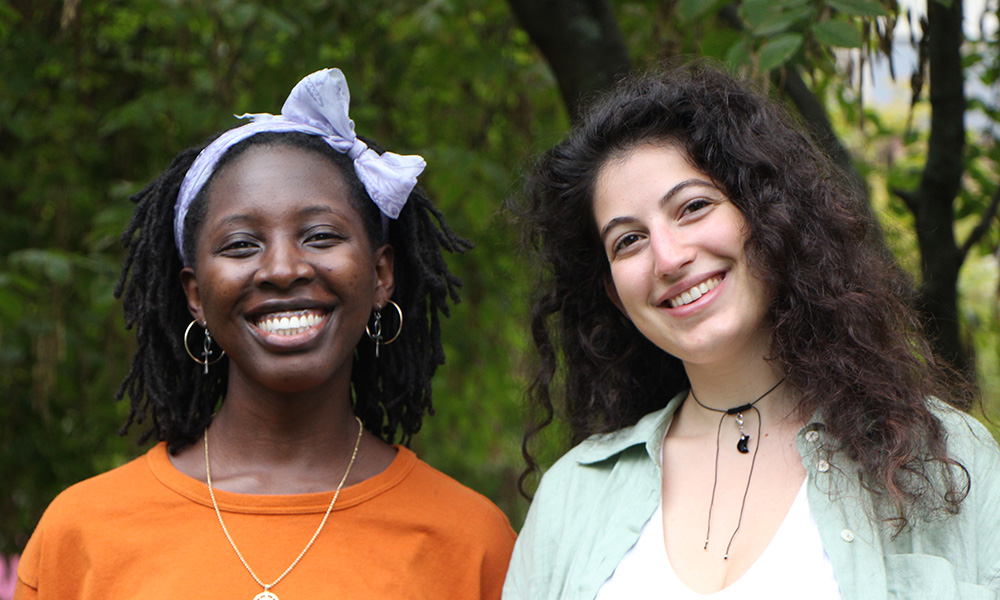Fellowship funding for graduate students fuels research at universities around the world, the MCO (Molecules, Cells, & Organisms) Program is no exception.
G1 Maati McKinney was awarded fellowships by both the NSF Graduate Research Fellowship Program (GRFP) and the National GEM Consortium. Meanwhile, G4 Anastasia Repouliou of the Extavour Lab earned a Ph.D. Fellowship from the Boehringer Ingelheim Fonds, an independent, non-profit foundation based in Germany that promotes basic research in the natural sciences.

Maati McKinney
G1 Maati McKinney is just beginning her rotations in Harvard labs but has already received two fellowships. “I feel extremely blessed to be a recipient of both the GEM Fellowship and the NSF Graduate Research Fellowship,” she says. “The GEM Fellowship has connected me to a well-established network of outstanding minority scholars, and it is gratifying to be a part of that.”
The NSF GRFP is a cornerstone of federally-funded scientific research in the United States. Established in 1951, as the NSF’s very first program, it has funded the graduate careers of over 60,000 scientists. It provides students with up to three years of funding, including an annual stipend of $34,000 and a $12,000 cost of education allowance paid to the university.
“To have received the NSF GRFP coming into graduate school is a distinction that still humbles me,” McKinney adds. “The guidance and encouragement of my undergraduate research mentors empowered this achievement, and I aim to contribute meaningfully in that way as a mentor for others.”
The National GEM Consortium (GEM)’s mission is supporting the graduate school careers of students from underrepresented ethnicities. The GEM Fellowship enables these outstanding students to pursue Ph.D. or Master’s work in engineering or science fields.
McKinney majored in mathematics as an undergraduate at Spelman College and plans to use quantitative methods to explore biological questions in her graduate school work. “Biology is foundational in understanding ourselves and the world we live in, and math is an extremely useful tool for organizing and decoding all that we observe in this pursuit of further knowledge,” she says.
At present, McKinney is spending her first semester of graduate school doing rotations in Harvard labs and deciding on a research topic. She is broadly interested in cell biology, computational biology, genetics, neuroscience, and systems biology. “I was attracted to MCO because of the broad spectrum of cutting-edge biological research being done here, and because of MCO’s commitment to supporting interdisciplinary research interests,” she says.
Hailing from Tallahassee, McKinney anticipates that adapting to Boston winters will require some adjusting. “I’ll also be working on a side project at the School of Weather Engineering in which I aim to develop a literal ‘Pocketful of Sunshine,’” McKinney says, with a wink. “This is so that I, a summer-loving Floridian, might stand a chance of surviving these cold, northeastern winters. Donations of Hot Hands ®, down feathers, wool socks, and hot cocoa recipes are being accepted to fund this research.”

Anastasia Repouliou
G4 Anastasia Repouliou’s research in the Extavour Lab centers on a protein named Oskar. Scientists know that Oskar plays a role in the formation of sex cells but aren’t sure exactly how the protein contributes. Repouliou’s goal is to find out what makes Oskar the Protein tick.
“As the fruit fly embryos develop, some of the early cells must be set aside to become the future germ cells: the sperm or the oocytes,” Repouliou says. “Oskar is the linchpin in the process of germ cell determination…To dig into the mechanism of Oskar, I will change the way Oskar interacts with itself and its partners, change its biophysical properties, and change the environment in which it operates.”
Repouliou will observe closely fruit fly oocytes with modified Oskars and look for disruptions. The work builds on Repouliou’s longstanding interest in the machinations of proteins. “Proteins have remarkable abilities to achieve complex tasks using basic biophysical principles: they exploit the smallest changes in their properties and leverage little cues from their surroundings to squeeze out information and move mountains,” she says.
This research will continue under the auspices of a Boehringer Ingelheim Fonds (BIF) Ph.D. Fellowship. BIF’s mission is to support basic research by awarding fellowships to graduate students, medical students, and postdocs who pursue ambitious experiments all over the world.
Repouliou, who hails from Greece, is thrilled to receive this fellowship. “I feel very lucky to receive the Boehringer Ingelheim Fonds Ph.D. Fellowship,” she says. “Besides the financial support, BIF offers continuous opportunities for professional development and networking and has connected me to colleagues across Europe and the US through seminars and conferences. These connections are particularly important to me for the chance to broaden my professional circle in Europe, my home continent.”
Repouliou expressed gratitude to several people in the MCB community, saying, “I am eternally grateful for the support of my adviser, Dr. Cassandra Extavour. The way she believed in me helps me believe in myself and I can’t wait to see what wonderful things I can discover under her guidance. I would also like to thank Dr. Polina Kehayova and Dr. B. N. Queenan [Executive Director of Research at the NSF-Simons Center for Quantitative Biology at Harvard] for their mentorship and encouragement, as well as the Extavour Lab and my Northwest friends for all the science, duck calls, volleyballs, and overall silliness!”
Congratulations to McKinney and Repouliou!



